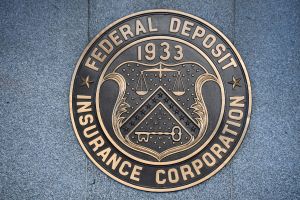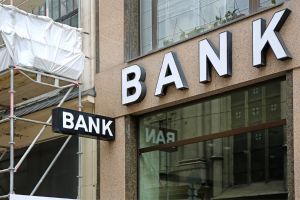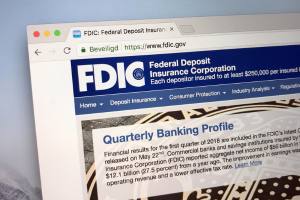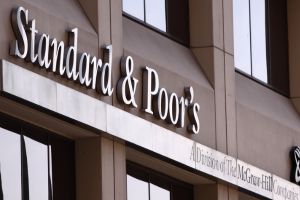![]()
When you put your money in the bank, you assume it’s going to be safe. Everything about the average bank branch is designed to make it look like a secure place to keep money.
There are cameras, security screens in front of the tellers and maybe even armed guards. We know from movies that bank vaults have heavy steel doors with elaborate locks, and safe deposit boxes show us miniature versions of that.
All this is just the physical security that stops thieves walking in and helping themselves to cash. On top of that there are laws and government schemes designed to protect savers if the bank itself runs into problems.
Your main protection against bank failures is the Federal Deposit Insurance Corporation (FDIC), which was set up in 1933. During the Great Depression over a third of US banks failed, and many people lost everything they’d saved.
FDIC’s goal was to make sure that, in future bank failures, even if people lost money they wouldn’t be completely wiped out.
 The way it works is that if a bank collapses, everyone who didn’t manage to get their money out of it on its way down will have their lost funds replaced by FDIC, up to a maximum of $250,000.
The way it works is that if a bank collapses, everyone who didn’t manage to get their money out of it on its way down will have their lost funds replaced by FDIC, up to a maximum of $250,000.
That’s actually fairly generous; in the UK, which has a similar scheme, the guarantee only covers up to £85,000 ($108,000).
It doesn’t cover everything, however, and if you’re lucky enough to have more than $250,000 saved, you could still lose everything above the protected amount.
Related: How Some People Got Rich During The Great Depression. You Need To Learn This Fast
If the existence of FDIC has persuaded you that bank deposits are well protected, here’s something you might find disturbing. 2023 was the biggest ever year for bank failures. Starting with the March collapse of Silicon Valley Bank, five financial institutions that held more than half a trillion dollars between them went under, and many people lost a lot of money.
FDIC paid out just $16.3 billion in compensation, meaning less than 3% of those banks’ assets were covered by the scheme. Bank failures are a real danger, and do you want to bet your savings on this year being any better?
We’re coming up to what could be the ugliest and most destructive presidential election in history, with the economy still fragile and the president taking some dangerous decisions in an attempt to boost his fading poll ratings.
There’s a high risk this year will be worse than last. If you have savings you need to make sure they’re protected. Here’s how to do it:
Pick the Right Bank
 The first thing to be aware of is that not all financial institutions are covered by FDIC.
The first thing to be aware of is that not all financial institutions are covered by FDIC.
All actual banks are, and so are federal credit unions, but many state credit unions aren’t. Non-traditional “neobanks”, like internet-only banks, might be backed by a traditional bank and covered by its FDIC membership, but some aren’t.
⇒ 3 Things to Get Done Before the 2024 Economic Collapse
Before you trust a financial institution with your money, make sure qualifies for FDIC protection. Otherwise you could lose everything – and non-traditional banks are the most likely to fail.
Put Your Money in Insured Products
FDIC insurance only covers some types of accounts. If a bank is holding money in one of those, it’s protected. The qualifying accounts are:
- Checking accounts
- Negotiable order of withdrawal accounts
- Savings accounts
- Money market deposit accounts
- Foreign currency accounts
- Time deposits (including certificates of deposit)
- Cashier’s checks, interest checks and other negotiable instruments
Anything else – including stocks, bonds, Treasury securities and most other investments – isn’t covered, so if the bank goes down you’ll lose them if you can’t withdraw them in time.
The ones that will catch a lot of people are insurance and annuities. They can have a large cash value, and they’re totally exposed if the bank collapses.
Use Ownership Categories
Even accounts that qualify for FDIC insurance come in different types. FDIC covers seven different ownership categories:
 Single accounts. These are standard bank accounts owned by one person.
Single accounts. These are standard bank accounts owned by one person.- Joint accounts. These have more than one owner, and all owners have equal withdrawal rights.
- Some retirement accounts, including IRAs.
- Employee Benefit Plan accounts.
- Accounts belonging to a corporation, partnership or unincorporated association.
- Revocable and Irrevocable trust accounts. These will contain wording like “In trust for” or “Payable on death”.
- Government accounts.
If a bank fails, all the accounts you have with it in the same ownership category are counted as a single account – so if you have three single accounts with $250,000 in each you’re only covered for $250,000.
However, up to three ownership categories can be counted separately; if you have a single account, a joint one with your partner and an IRA, with $250,000 each, you’re covered for the whole $750,000.
Spread the Risk
If you have multiple accounts consider holding them with different banks. Even if both banks fail at the same time, they’re counted separately for compensation. Going with the example above, if you have a single account, a joint one and an IRA in each of two banks your FDIC cover grows to $1.5 million.
Related: 10 Great Depression Era Strategies For Saving Money
One thing to look out for is that some brick and mortar banks also have an internet branch that operates under a different name. FDIC doesn’t care about the name; if your physical and online banks are part of the same organization, it counts them as the same bank.
The goal is to distribute your savings so that all of it comes in under FDIC’s $250,000 per account cap. That way, as long as FDIC itself is still going, everything’s covered.
Research Your Bank
 Before you put your money in a bank, do some research. Look into its credit ratings with the three big agencies – Moody’s, Fitch and Standard & Poor.
Before you put your money in a bank, do some research. Look into its credit ratings with the three big agencies – Moody’s, Fitch and Standard & Poor.
Check FDIC’s own ratings; these use a six-point test to calculate how stable a bank is. A high-scoring bank is at less risk of failure.
Bigger Can Be Better
Small, new banks can be very attractive, because they often give great deals to attract customers. They might pay higher interest rates, or provide other bonuses. That makes them look like a better option than older, more conservative banks.
The government doesn’t see it that way, though. There are a few banks – for example Bank of America, Citi, JP Morgan and Wells Fargo – that the government classes as “too big to fail”.
Related: The Desperate Measures the Government Is Secretly Resorting To
If one of those went down it would do massive damage to the economy, so if they’re struggling the government will do whatever it can to bail them out and keep them afloat. We all saw that in 2008, and while it was painful it’s better than being caught in a bank failure.
Don’t Panic
If you hear rumors that your bank is in trouble, be ready to act – but don’t spread the rumor and don’t rush into anything.
When banks have problems, and all their customers rush to rescue their cash, that can cause a run on the bank and cause the very thing everyone’s worried about. Usually, the bank fails faster than everyone can withdraw their cash.
Don’t Trust the System
The FDIC system is actually pretty good, but it isn’t perfect. Insulate yourself by keeping some of your savings somewhere else. This is where that old prepper standby, gold, comes in.
In the long term gold will gain value; it always does. There’s a finite amount of gold and people are always finding new things to do with it, so demand is guaranteed to keep rising and that drags the price up.
Bank failures can be scary, but if you know what you’re doing they don’t have to be a disaster for you personally.
For most of us, having more than $250,000 in a checking account is a daydream anyway; where we need to take precautions is in IRAs and similar long-term savings.
Just protect those against the risk of a collapsing bank – putting them in one of the “too big to fail” institutions is the obvious way – and you can get through a year like 2023 without having to worry too much.
You may also like:
 What Happens If You Put Banana Peels In Your Garden?
What Happens If You Put Banana Peels In Your Garden?
Where Free Land Can Still Be Found in the USA (Video)
The Ultimate Chicken Meat Processing Guide for Preppers
5 Survival Tools And Gear You Should Avoid When SHTF
How to Conceal Weapons in Your Vehicle



